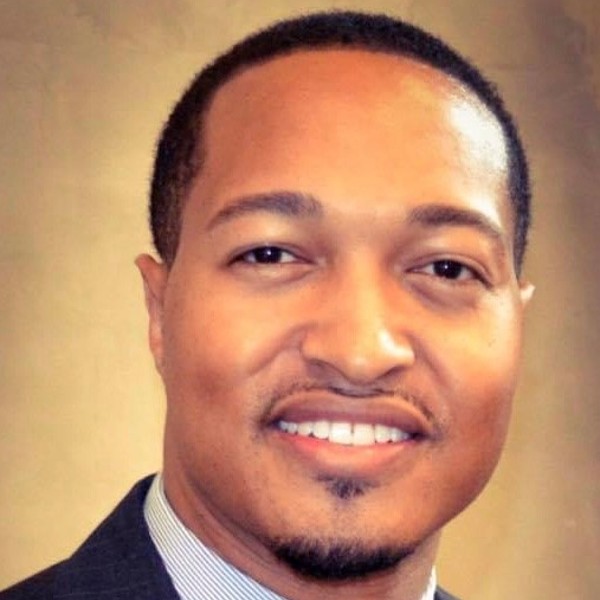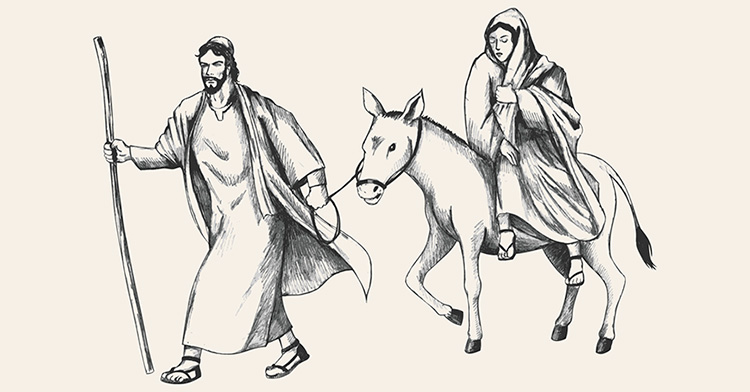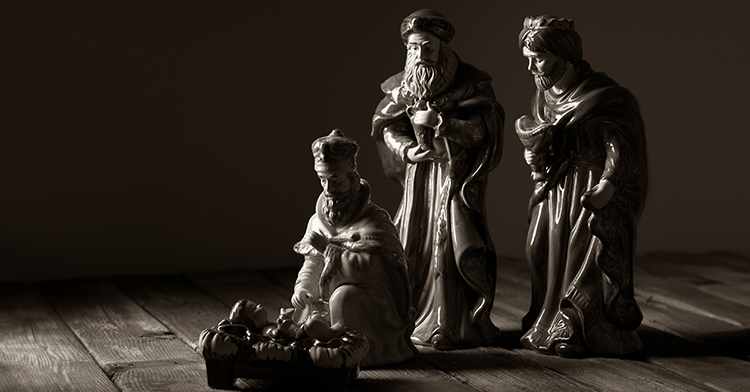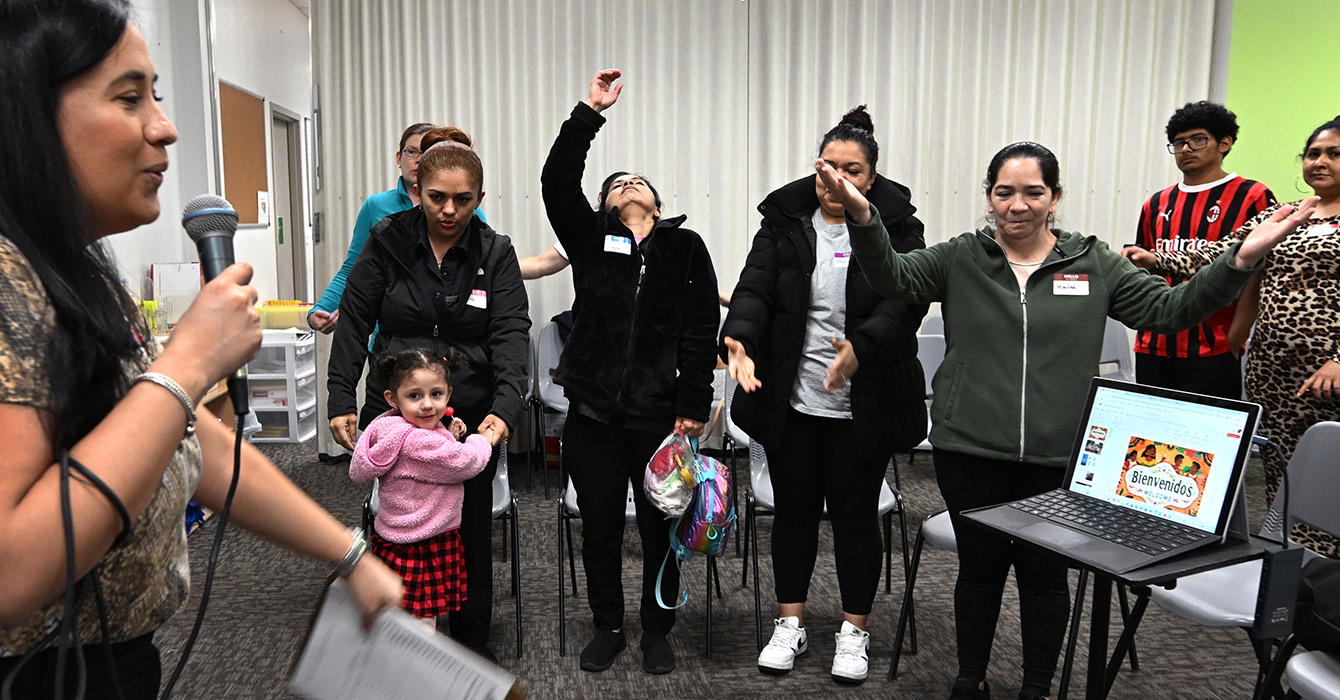I’ve never really been able to relate to Mary, least of all during Christmas. At times, this has felt like an embarrassing deficiency in me, as someone who was raised Catholic and shaped feminist. I mean, shouldn’t I be grateful for the mention of any and every woman in a tradition largely written by men? Perhaps. But I also think there are good reasons for my ambivalence toward Mary during this time of year — and good news for those who feel likewise.
To start, I have never birthed a child, nor have I ever wanted to. In fact, I’ve spent the entirety of my 15-year marriage not consenting to pregnancy, through a determined combination of the Pill (me) and minor surgery (my husband).
When curious minds ask why, I might say, “I didn’t have an imagination for a bodily roommate” or, “We felt called to grow community a different kind of way.” When I’m feeling brave, I might even say, “Why does there have to be a why?” The question itself marks me and my body as “not normal woman material.”
So the idea that I should be able to relate to a belly-rubbing Mary makes me prickly. It makes me prickly because this Mary may be the only graphic of a woman’s body I see all year in a church bulletin, and this body does not look like mine. I do not know what it’s like to gaze down and see life within life ballooning out. But I do know that I’m not alone — an estimated one-third of adult women in America between the ages of 20 and 50 have never birthed a child — and I do know that the church is already a tough place for the childless to belong.
Thanks to a small dumpster of research I’ve accumulated over the years, I’m well aware of the stigma against me and my kind, especially among religious people. For example, one study found a positive correlation between how often people attend worship and how often they reproduce, while another study found that the more literally people read the Bible, the more likely they were to have a low opinion of childlessness .
I don’t want to argue that Mary alone is to blame for the bias against the childless in Christianity — I can think of more than a few causes, starting with a narrow and individualistic reading of the blessing “Be fruitful and multiply.” But I do worry that the veneration of Mary risks fueling the veneration of motherhood, or what I like to call the myth of maternal exceptionalism.
The myth of maternal exceptionalism sees mothers as not just different but better, morally speaking, than those who are not mothers. Mothers are more mature. More selfless. Even more godlike.
Mary often appeared godlike in the Advent tellings of my youth. Far from inspiring me, I think this only fueled my suspicion of her. When asked to choose a confirmation name as a preteen, I picked Esther for reasons both noble and vain. Mary’s story felt too sweet by comparison. A faithful virgin. A willing mother. And, according to Catholic doctrine, sinless like Jesus. As if to counter the association between birthing pain and sin introduced by Eve, Mary’s delivery was depicted as painless and placid. So placid that, according to my favorite carol, the night — and newborn — were blessedly silent.
I may not have given birth, but even now, I can see how shaming this sanitized portrait of Mary might be for biological mothers who fail to feel equally blissed. The woman with postpartum depression. The woman who can’t seem to master sleep training. The woman who never wanted a pregnancy and is pressured to sigh now, “But I couldn’t imagine my life without them.” The woman who just wants to get back to work already.
The adoration of Mary as “exceptional woman” risks diminishing not just the childless but any woman who fails to find her highest meaning in motherhood.
It was a desire to be not a blessed mother but a decent neighbor that eventually led my husband and me to foster and, rather unexpectedly, adopt three school-age girls. Here was a way of showing up in community that actually fit my nature and calling. I loved that my body didn’t have to house a child to practice hospitality to the holy. Co-parenting with all sorts of adults softened the emphasis on my uniquely female experience and created a feeling of equity (and relief). Slowly, the word “mother” changed in my vocabulary from a noun to a verb.
I wonder whether this linguistic shift might be my invitation into the Mary story. My theologian friend Kelley Nikondeha shares an experience similar to mine. Biologically child-free, she, too, unexpectedly became an adoptive mother out of a commitment not to parenting but to community. Now, her new book, “The First Advent in Palestine: Reversals, Resistance and the Ongoing Complexity of Hope,” has me convinced that the Mary story has something in it for me too.
“I could never relate to Mary either,” she tells me in an interview. “I didn’t want to be a mother. I never desired to be pregnant. I didn’t feel any pain over the traditional depictions of Mary, just ambivalence. So it’s the freedom song she sings that’s been my connection to her.”
I don’t know why I hadn’t thought to look to the freedom song in Luke’s Gospel (Luke 1:46-55) for Marian inspiration before. Maybe because it had always struck me as a hearty endorsement for pregnancy? But for Kelley, the passage puts the edge back on mothering. Mary sings not because her motherhood will reproduce the status quo but because her mothering will subvert it.
The lowly will be favored.
The proud will be scattered.
The hungry will be filled.
The rich will be emptied.
“Here is Mary,” Kelley says, “a girl from Galilee, shaped by resistance. A young woman with strength and resolve, who was likely more subversive than submissive. A woman who suffered deep humiliation and still agreed to participate in God’s liberation work for the sake of her people.”
What might this revolutionary mothering look like in congregations during Advent, I wonder. Maybe it’s depicting Mary with the “Yes we can” fist of Dolores Huerta. Maybe it’s preaching Mary with the “master’s tools will never dismantle the master’s house” wisdom of Audre Lorde. Maybe it’s placing her in a long history of God’s people who are called to usher in beloved community — “thy kin-dom come” — whether they ever partner, parent or procreate.
Looking at Mary through this revolutionary lens has helped me identify with Mother Mary. But I want to stress that I still identify as someone other than a Mother Mary too. (There’s only so much Mary can do, Kelley gently reminds me.)
So I’m grateful for the presence of other examples of a life well-lived in the Christmas narratives. Like Joseph. Joseph, who does not so much consent to parent as concede. Joseph, whose body incubates not babies but dreams. Joseph, who is less the star of the nativity scene than a supporting player on a co-parenting team. I’m happiest this way.
That I feel like I should be able to relate to Mary simply because I’m a woman ignores all the other blueprints for a good life, both modern and ancient, available to me regardless of gender. It ignores that while Mary may have carried Christ in her womb, the good news is that a biologically childless Christ encompasses us all.















